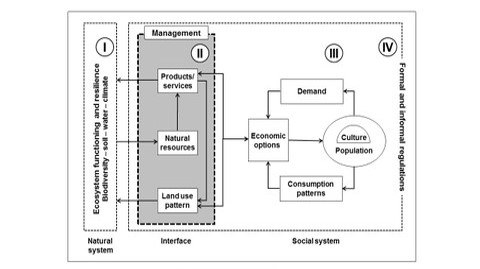Socio-Economics in Forestry Research Group
Background rationale:
We understand socio-economics as the interplay of social and economic perspectives. While economic development is all about improving production and consumption of goods and services for the benefit of actors, social development, on the other hand, aims for inclusion and equity. Our approach in socio-economics is based on a sound diagnosis and understanding of the studied case, with the aim for identifying action for sustainable development and impact.The overall development target is the transition of forest sectors and forest utilization systems towards sustainable forest management and continuous forest products and service provision, including the subsequent value chains.
The need to address socio-economic aspects to achieve global challenges, such as the climate crisis and forest degradation, is increasingly acknowledged. Research in socio-economics in the context of forestry contributes to closing the gap in rural development and Forest Landscape Restoration (FLR) efforts, thereby attaining the Sustainable Development Goals (SDGs) and the Global Forest Goals.
On a global level growing population, as well as increased demand for forest and timber products and continuing deforestation results in a challenging scarcity of forest products. To fill this gap, smallholder forest farmers, alongside rural entrepreneurship can contribute to improve rural livelihoods and overcome resource scarcity at the local level.
These approaches often rely upon value chain upgrading or development, collective action, innovation and transformation processes. To achieve this, a sectoral approach is required that actively includes forest enterprises and organizations as well as NGOs from within and beyond the forest sector. These efforts ideally build upon local contexts, cultures and aim to improve the existing clusters in the fields of bio-economy, circular economy, and social and solidarity economy approaches.
Group Speaker: Dr. Kendisha Soekardjo Hintz
 © Institut
© Institut
Research Associate
NameDr. Kendisha Soekardjo Hintz
Project coordination emPOWER & institute public relations
Send encrypted email via the SecureMail portal (for TUD external users only).
Professur für Tropische und Internationale Forstwirtschaft
Besucheradresse:
Cotta Bau, Zimmer 0.12 Pienner Straße 7
01737 Tharandt
None
Institute Members:
 © Lassig
© Lassig
Prof. Dr. Jürgen Pretzsch
Senior Professor
Send encrypted email via the SecureMail portal (for TUD external users only).
 © Lassig
© Lassig
Dr. Eckhard Auch
Research associate
Send encrypted email via the SecureMail portal (for TUD external users only).
Visiting address:
Cotta Bau, Room 0.09 Pienner Str. 7
01737 Tharandt
 © TUD
© TUD
Doctoral Candidate (Vietnam)
NameQuoc Dung Phan M.Sc.
Send encrypted email via the SecureMail portal (for TUD external users only).
Professur für Tropische und Internationale Forstwirtschaft
Besucheradresse:
Cotta Bau, Zimmer 0.08 Pienner Straße 7
01737 Tharandt
None
External Associates: Dr. Michael Jenke, Dr. La Thi Tham, further members TBC
forming a self-organized research group
Key research questions that we address include:
-
Diagnosis: What factors are required to foster effective endogenous development in the small-scale forest sector enterprises in rural areas?
-
Understanding: How to upgrade forest based production and commercialization systems (motivation of innovation adoption, collective action, social capital)?
-
Transformation: How can the micro and macro level links be leveraged for improved forest based sustainable development?
Key conceptual approaches rely on production systems grounded on farm system research (FSR), epistemology and endogenous knowledge systems (e.g. indigenous knowledge and practices systems), sustainable livelihoods, multilevel approaches (micro-macro), innovation systems, participation & learning mechanisms, value chains, forest-wood cluster, Corporate Social Responsibility (CSR), and System Thinking Approach.
Typical methods include financial analysis specifically of smallholder systems as well as economic analysis. These inquiries are mainly empirical and often apply participatory approaches such as Participative Innovation Platforms (PIPs), socio-economic field laboratories, and change and transformation management.
Outputs: The group supervises Master students for seminar papers and thesis elaboration, and provides a platform for Post-Doc & Junior Professors. The research group further actively engages in networking also well beyond academia and contributes to teaching and research at the institute. In addition, the group’s expertise and insights from research can be applied through research projects and also by providing consulting services.
Theoretical and Methodological Grounding
Pretzsch et al. (2014: 376): The co-evolution (social-ecological systems) model as an analytical model. I = Ecosystem, II = (Tree) management system, III = Social system, IV = Institutions and governance
Source: Pretzsch, J.; Darr, D.; Lindner, A.; Uibrig, H.; Auch, E. (2014) Prospects of forest-based rural development. In: Pretzsch, J., Darr, D., Uibrig, H., Auch, E. (Eds.) Forests and Rural Development Springer Berlin Heidelberg (Tropical Forestry 9): 375-348.
The natural system (Part I) builds the foundation of the social-ecological system by providing a functioning and resilient ecosystem. The Interface (Part II) is the platform for management and use of the resources, which are in turn processed, commercialized or consumed in Part III, the social system. Finally, Part IV addresses the institutions and governance that regulate the social system and the interface with the natural system. For our work, this specifically comprises the various levels of governance from global forest and development agenda and relevant rules further to regional agreements and regulations (e.g. EU supply chain regulation) as well as national and local or even tribal, indigenous rules, regulations and informal systems.
We identify the levers (agents of change) and entry points (priorities) to interlink socio-economic research results to governance aspects. With regard to the actual condition, it is related to policy coherence. They consist of three core points as follows: (1) how to communicate the research results as the academic-basis thinking to transform to policy making, (2) how to promote coherence between policies at regional level vis a vis the national level, and (3) how to transform the silos approach towards more integrated approaches.
DOCTORAL THESES
Phan Quoc Dung: Forest Farmers' Organizations in timber value chains: Financial performance, power, and governance
PAST DOCTORAL THESES
2024. Sri Astutik: Management of Medicinal Plants' Production Systems: Contrasting Analyses of Wild Gathering and Cultivation Systems in Java, Indonesia
2023. Marcel Starfinger: Financing smallholder tree planting through tree collateral in Thailand and beyond
2023. Kendisha Soekardjo Hintz: The potential roles of forest farmers’ organizations in wood value chain upgrading in Eastern Africa
2022. Dagninet Amare Ayshesim: Agroforestry Adoption in Ethiopia: Innovation Systems and Farm Level Analysis
2021. Busha Teshome. Cluster analysis for forest and wood-processing industry sector development in Ethiopia
2021. Tran Van Hiep. Key Factors Affecting Small Bamboo Enterprises Upgrading in North Vietnam: Case Studies from Chuong My, Hanoi and Thanh Hoa Province
2021. La Thi Tham. A transition towards higher value uses of natural-resource based products: Case study of value chains and impacts on rural livelihoods of Acacia hybrid timber in Central Vietnam
2019. Pyi Soe Aung. Social-Ecological Coevolution and its Implications for Protected Area Management: Case Study in Natma Taung National Park, Myanmar
2018. Francis Moyo. Community Based Conservation in Tanzania: Discourses and Realities.
2018. Maxi Domke. Knowledge Management for Climate Change Adaptation - A Multi-Level Governance Analysis of Environmental Management in Ethiopia

